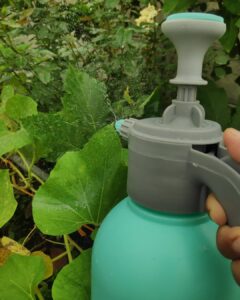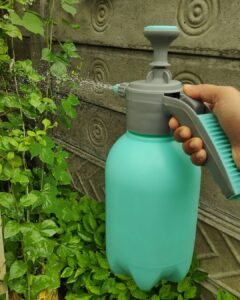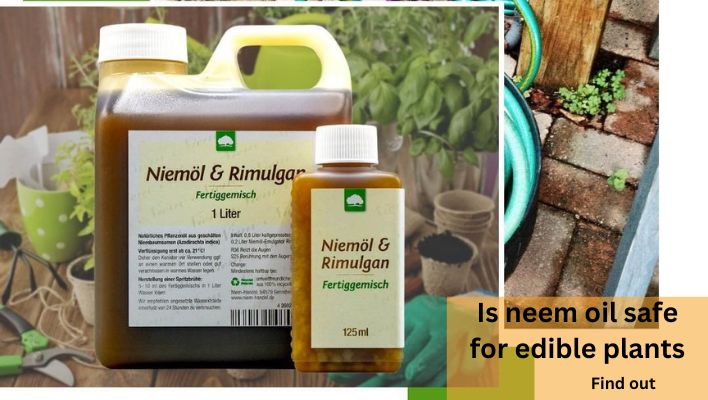Are you an avid gardener or someone who loves to grow their fruits and vegetables? If yes, then you must have heard about neem oil and its uses in gardening. However, the question that arises is whether neem oil is safe for edible plants or not.
Neem oil is extracted from the seeds of the neem tree, a native plant of India. It is widely used in organic gardening as a natural pesticide, insecticide, and fungicide. The oil contains a compound called azadirachtin, known for its insecticidal properties.
But the question is, can we use neem oil on our edible plants without worrying about potential health hazards? The answer is yes; when used correctly, neem oil is safe for edible plants.
This blog will discuss everything you need to know about using neem oil on edible plants, including its benefits, potential risks, and how to use it to protect your crops.
Is neem oil safe for edible plants?
Neem oil is a natural oil extracted from the seeds of the neem tree. It has been used for centuries in traditional medicine and is known for its insecticidal, antifungal, and antibacterial properties, and beneficial to the garden, as stated by (JPSR).
Neem oil is commonly used as a pesticide to control pests in gardens, farms, and greenhouses. It can also be used as a natural remedy to treat various ailments, including skin conditions and digestive problems.
The question of whether neem oil is safe for edible plants is a valid concern for those who want to use it in their vegetable gardens or fruit orchards.

Some studies have suggested that neem oil can negatively affect some edible plants, such as tomatoes, peppers, and cucumbers. These plants may experience stunted growth or even die if exposed to high concentrations of neem oil or unproperly diluted neem oil.
Therefore, it’s crucial to use neem oil in moderation and follow the manufacturer’s instructions on the label. Also, While neem oil is generally safe for most plants, it’s important to note that it can be toxic to some beneficial insects, such as bees and ladybugs.
It’s best to apply neem oil when these insects are inactive, such as in the evening or early morning. It’s also important to note that neem oil is not an instant solution for pest control. It can take a few days for neem oil to take effect and may require multiple applications to control the pest population fully.
Overall, neem oil is a safe and effective way to protect your edible plants from pests, as stated by the Journal of Pharmacognosy and Phytochemistry, with some advantages such as
- Acting as a natural fungicide to prevent and treat fungal diseases like powdery mildew, rust, and leaf spot.
- Repelling and deterring common pests like aphids, spider mites, whiteflies, and mealybugs.
- Boosting plant growth and health by stimulating the immune system and enhancing nutrient uptake.
How long after spraying neem oil can you eat vegetables?
If you’re using neem oil to control pests on your vegetables, it’s important to know when it’s safe to start eating them. Neem oil is generally considered safe for consumption, but it’s important to wait a certain amount before consuming the vegetables.
The time you need to wait after spraying neem oil on vegetables depends on several factors. These include the type of vegetable, the concentration of the neem oil solution, the weather conditions, and the time of day when the spray was applied.
As a general rule, waiting at least 1-2 days before harvesting and consuming vegetables sprayed with neem oil is also recommended by Oregon state university. This allows the oil to dry and the residues to break down naturally. It is also important to wash the vegetables thoroughly with clean water before consuming them to remove any remaining residues.

For leafy vegetables like lettuce, spinach, and kale, it is best to wait for 3-4 days after spraying neem oil before harvesting and consuming them. This is because these vegetables have a larger surface area, and it takes longer for the oil to dry and break down.
If you use a neem oil solution that is more concentrated than the recommended dose, it is important to wait longer before harvesting the vegetables. Similarly, if the weather is cool and humid, or if you spray the vegetables late in the day, it may take longer for the neem oil to dry and break down.
Is neem oil safe for tomato plants?
Neem oil is generally considered safe for tomato plants as it is a natural and organic product. It has been used as a natural insecticide and fungicide for centuries, effectively controlling various pests and diseases affecting tomatoes and other plants.
However, using neem oil as directed and not applying it excessively is important, as this can lead to leaf burn and other plant damage. It is also important to note that neem oil should not be applied during the day’s heat or when temperatures are above 90 degrees Fahrenheit, as this can also cause leaf burn.
Also, it is important to follow the instructions on the label carefully to ensure that it is used correctly and at the appropriate concentration. It is also important to test a small area of the plant before applying it to the entire plant to ensure that it does not cause any adverse effects.
Is neem oil safe for all vegetable plants?
Neem oil is generally safe for most vegetable plants. However, like with any pesticide, there are some precautions you should take to avoid harming your plants or affecting the quality of your produce.
First, it is important to use high-quality neem oil intended for agricultural use. Some neem oil products sold for cosmetic or personal care purposes may contain additives or impurities that can harm plants.
Second, neem oil should be used in moderation and according to the instructions on the label. Overuse or misuse of neem oil can lead to leaf burn, stunted growth, or even death of your plants.
It is also important to avoid spraying neem oil during the hottest part of the day, as this can cause the oil to evaporate too quickly and reduce its effectiveness.

What plants not to use neem oil on
Neem oil is a popular organic pesticide and fungicide known for its effectiveness in controlling many insect pests and plant diseases. However, some plants may not respond well to neem oil and may be harmed by its use.
Some plants that are particularly sensitive to neem oil include:
- Japanese maples
- Honeysuckles
- Ferns
- Water lilies
- Some succulents
- Some orchids
- Impatiens
- Gardenias
- Desert rose
- Fuchsia
Also, some delicate seedlings can be easily damaged by neem oil. Avoid using neem oil on seedlings as it can cause stunted growth, leaf drop, and plant death.
If you are unsure about the suitability of neem oil for a particular plant, it is best to test a small area of the plant first before applying it more widely. Additionally, it is important to follow the manufacturer’s instructions for dilution and application, as overuse or improper use of neem oil can cause damage to plants.
Is neem oil safe for herbs?
Neem oil is generally considered safe for herbs when used in appropriate concentrations and formulations. It has been traditionally used in herbal remedies for its insecticidal, antifungal, and antibacterial properties.
However, excessive or improper use of neem oil can harm some plants and cause phytotoxicity or other adverse effects. Therefore, following the manufacturer’s instructions and consulting with a professional before using neem oil on herbs is recommended.
Additionally, it is important to consider the potential impact on beneficial insects and other non-target organisms when using any pesticide or herbicide. When used responsibly, neem oil can be a useful tool for managing pests and diseases in herbs.
Is neem oil safe for humans to eat?
Neem oil is ideal for various purposes, such as pest control, skincare, and even oral hygiene. While it is safe for external use, the question of its safety when ingested by humans arises.
Research has shown that neem oil is generally safe for human consumption in small amounts, as it contains antifungal, antibacterial, and anti-inflammatory compounds. However, it is important to note that neem oil should not be consumed in large quantities or for prolonged periods.
Moreover, consuming neem oil may lead to side effects such as stomach upset, vomiting, and diarrhea. It is also important to note that pregnant women or individuals with liver or kidney problems should not consume neem oil.

Are there any side effects of using neem oil
When used in large amounts or over a prolonged period, neem oil can be toxic to plants. This is because the oil contains compounds called azadirachtin and Nimbin, which are toxic to some insects and microbes. However, when used in moderation, neem oil is generally safe for most plants.
When it comes to human consumption of neem oil, there are some potential side effects that you should be aware of. Consuming neem oil can cause nausea, vomiting, diarrhea, and stomach cramps. It can also cause liver damage, especially when consumed in large amounts over a prolonged period.
In addition to its potential side effects, neem oil can interact with certain medications, including birth control pills and medications used to treat diabetes. If you are taking any medications, talking to your doctor before using neem oil is important.
In conclusion, while neem oil is generally safe for use on plants, it can be toxic when used in large amounts or over a prolonged period. When consumed by humans, neem oil can cause nausea, vomiting, and other digestive problems, as well as liver damage and interactions with certain medications. As with any pesticide or herbicide, it is important to use neem oil carefully and according to the instructions on the label.
Can neem oil kill plants
Neem oil, when used in excessive amounts, has the potential to harm and even kill plants. While neem oil is generally considered safe to control pests and diseases, it can cause damage if applied in concentrations that are too high or not diluted.
This mechanism can also affect beneficial insects and pollinators, causing harm to the ecosystem. Using neem oil as directed and in moderation is important to prevent any adverse effects on plants or the environment.
Therefore, using neem oil judiciously and avoiding spraying it indiscriminately is essential. Always follow the instructions on the label and use the recommended dosage.
It’s worth noting that neem oil can have a negative impact on some plants if used excessively or improperly. For example, some sensitive plants like ferns, palms, and orchids may be more susceptible to damage from neem oil than others.
Additionally, if neem oil is applied during hot, dry weather or in direct sunlight, it can cause burning or scorching of the leaves.
How to use neem oil on plants
Neem oil is an effective natural solution to protect plants from pests and diseases. Following these steps, as analyzed by jbiopest, you can properly use neem oil on plants and enjoy healthy, vibrant plants in your garden.
- Choose the right time to apply neem oil: It can be applied at any time during the growing season, but it is best to apply it in the morning or evening when the temperature is cooler. Avoid applying it during the hottest part of the day, as it can cause damage to the plant.
- Dilute neem oil: Neem oil is very concentrated, so it needs to be diluted before use. Mix one tablespoon of neem oil with one quart of water, or follow the instructions on the product label.
- Shake the mixture: Neem oil can separate from the water, so shake the mixture well before use.
- Test a small area: Before applying neem oil to the entire plant, test a small area first to ensure the plant is not sensitive to it. Apply the diluted neem oil to a small section of the plant and wait for a few days to see if there is any adverse reaction.
- Apply neem oil: Using a sprayer or spray bottle, apply the diluted neem oil to the entire plant, including the leaves, stems, and flowers. Make sure to cover all areas of the plant, but avoid spraying to the point of run-off.
- Reapply as needed: Neem oil is not a one-time solution. Depending on the severity of the pest or disease, you may need to reapply every 7 to 14 days. Always follow the instructions on the product label.
- Store neem oil properly: Store neem oil in a cool, dry place away from direct sunlight. It can last up to two years if stored correctly.
To avoid any potential harm to your plants, doing a small patch test before using neem oil on the entire plant is best. Simply spray a small amount on a few leaves and wait 24 hours to see if there is any adverse reaction. If the plant shows signs of stress or damage, dilute the neem oil or try a different insecticide altogether.
Conclusion
After researching and evaluating various sources, it is safe to say that neem oil is generally safe for edible plants when used properly. Neem oil has been used for centuries in traditional medicine and agriculture and has proven to be an effective natural pesticide and fungicide.
However, it’s important to note that the concentration and application of neem oil should be carefully considered. Improper use of neem oil can adversely affect plants and even pose a risk to human health if ingested.
When applying neem oil to edible plants, following the manufacturer’s instructions and only using it as directed is crucial. This includes using the appropriate concentration and dilution and applying it at the right time and weather conditions.
It’s always recommended to wash fruits and vegetables thoroughly before consuming them, regardless of whether or not they have been treated with neem oil.
It’s also important to be aware of the potential risks and to take precautions to protect yourself and others from exposure to the oil. By following the recommended guidelines and being mindful of its potential risks, neem oil can be a valuable tool for promoting healthy and thriving gardens.
